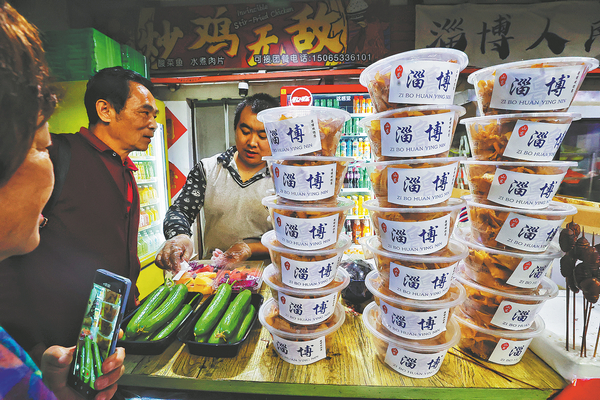

Visitors enjoy barbecued food, pancakes and beer in Zibo, Shandong province. CAO BOYUAN/WANG ZIRUI/FOR CHINA DAILY/HUANGPU XIAOWEN/XINHUA
Student posts
Zibo has long sought to publicize its unique take on roasted skewers of meat, vegetables, seafood and other foodstuffs in the hope of attracting business.
But it was only in March, when college students tried the barbecue food, took videos of themselves enjoying it, and posted the footage on social media that it went viral.
Last year, more than 12,000 college students from other cities were quarantined in Zibo during the COVID-19 pandemic. After they completed their quarantine, the local authorities treated them to barbecue food and invited them to return for a visit in spring, when the flowers are in bloom. Some students accepted the invitation, revisiting Zibo to sample its barbecued delights.
They unwittingly triggered a trend that spurred the hashtag "College students visit Zibo to try barbecue in groups", which went viral on social media platforms.
Since then, young people from across the country have flocked to Zibo to try its barbecued food.
During weekends last month, Yang Benxin, who has run a barbecue restaurant in the city for nearly three decades, used a loudspeaker to tell people waiting in line for a table to choose another restaurant because the meat at his business had sold out.
Yang's restaurant has 200 tables, which can accommodate about 1,000 diners. But almost every weekend for the past month, the number of people visiting the eatery surpassed its capacity, forcing him to tell those waiting to try elsewhere.
Zhu Wenbin, the owner of another local restaurant, has raised the number of tables at the business from 60 to 200 to cater to the influx of diners.
In Zibo, the food on barbecue skewers is 70-80 percent precooked before it is brought to the table, where diners complete the cooking process on small stoves fueled by hot coals. In addition, pancakes, scallions and dressings are on the tables, so diners can assemble their own barbecue-filled packages, similar to the way in which Peking duck is eaten.
Zhang Hanzhe, 27, who visited Zibo with friends from Jinan, capital of Shandong, during the May Day holiday to try the city's barbecued food, said, "We prepared the food according to our own tastes, and it's also affordable."
The authorities in Zibo have been quick to capitalize on the sudden influx of visitors. The market supervision and public security authorities acted to ensure food safety and reasonable pricing in the barbecue sector, while the city's public transportation company launched bus routes especially for people visiting barbecue restaurants.
The city issued a notice ahead of the May Day holiday, warning that hotels in Zibo that raised their room rates by more than 50 percent during the holiday would be punished.
Fu Qiang, who runs a restaurant in the city, said, "Police officers have been patrolling the streets, and officials from the market supervision bureau monitored food quality to avoid health risks.
"Local people are friendly to visitors, and it seems that everyone in the city is working together to give them an enjoyable experience in Zibo."
Qu Chuang, a professor at Shandong University's School of Economics, doubted whether the barbecue craze in Zibo would last long, but said the city's biggest gain is that it is now known by more people.